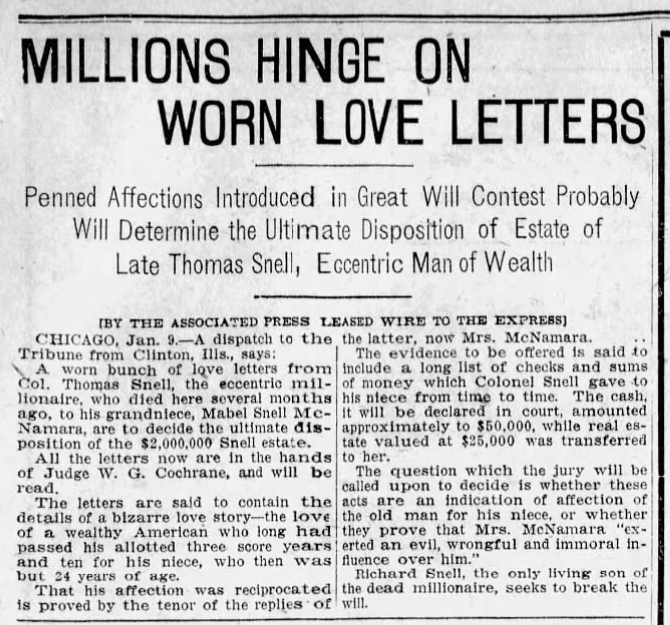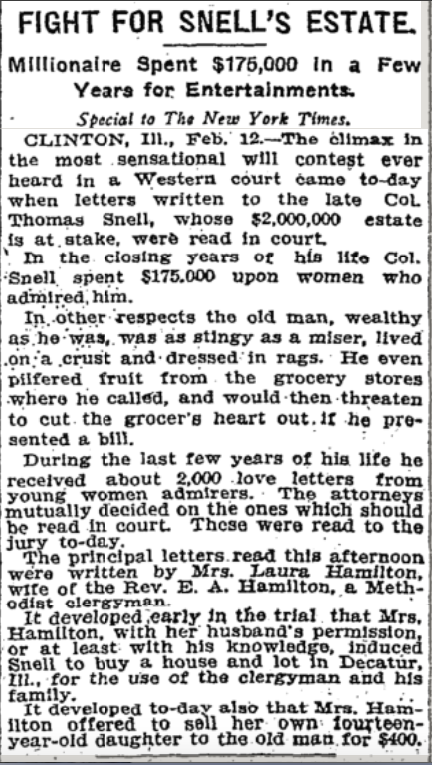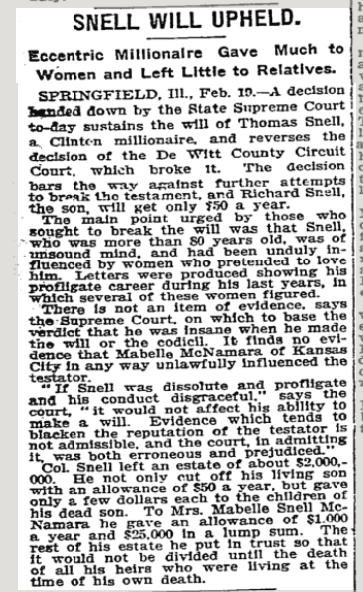Lawsuits
The Perfect Rose Case
Technical Sergeant Valentine Browne Lawless was shot down over Linz, Austria in October 1944. He left behind a will revealing that, as his first name suggested, he had a romantic streak.He left the bulk of his small estate (worth $3600, or around $50,000 in today's money) to one of his brothers for a "special purpose." He detailed that special purpose in a separate latter. He wanted his brother to arrange to have "one perfect rose" anonymously sent every Saturday to Mildred Fitzpatrick, until the money ran out.
Valentine had worked with Mildred before the war, but the two had never dated. In fact, she barely knew who he was. He had fallen in love with her from afar, and because he was extremely shy he had never told her about his feelings. Valentine explained to his brother:
I love her very much and would like to be the type of person that could make her love me and marry me and be able to support and provide her with those things which it is such a pleasure to give to anyone you love.
But as I am not a personality that is likely to be successful socially or financially, I must make this request.
Unfortunately, Valentine's romantic gesture turned out to be in vain. A few roses were sent, but the deliveries soon stopped, for two reasons.
First, Valentine's other siblings successfully challenged the will, on the grounds that the rose deliveries were detailed in a separate letter, not in the will itself. Therefore, the will had failed to specify the "special purpose". The case became known as the "perfect rose case," and the court ended up splitting Valentine's estate between his sister, two brothers, five nephews, and a niece.
Second, Mildred didn't want the roses. She really didn't want them. She was married, with a daughter, and found the publicity deeply embarrassing. She ended up suing the Hearst Corporation for publicizing the case and for describing Valentine as her "suitor" even though she barely knew him. She lost the case, but her feelings were clear. So, no more roses.

San Francisco Examiner - June 20, 1948
click to enlarge

Winston Salem Journal - Aug 8, 1947
Posted By: Alex - Fri Feb 14, 2025 -
Comments (1)
Category: Lawsuits, Inheritance and Wills, 1940s, Love & Romance
Malicious Enticement
Nov 1971: The mayor of Evansdale, Iowa left his wife to be with a city clerk. This prompted the mayor's wife to sue the clerk for "maliciously enticing" him away from his wife. The husband of the clerk simultaneously sued the mayor on the same grounds. Therefore the mayor and the clerk were potentially guilty of maliciously enticing each other.I hadn't been aware of 'malicious enticement' as a legal category. A search for the term mostly turns up uses in the business world, where a business could be held liable for maliciously enticing employees away from another business.
The Hollywood ad men missed an opportunity by not crowning a young woman 'Miss Maliciously Enticing'.

Davenport Quad-City Times - Nov 5, 1971
Posted By: Alex - Fri Jan 17, 2025 -
Comments (2)
Category: Lawsuits, Divorce, 1970s
Brenda Butler Bryant, serial litigator
The article pasted below, from 1994, describes Brenda Butler Bryant's "record-setting litigation." In one year alone she had filed over 700 lawsuits, accounting for 7 percent of the lawsuits filed in the federal courts. Finally a judge ordered her to stop, stating that her handwritten complaints were "frivolous" and "plainly products of a confused, disoriented and unsound mind."Did she stop? Apparently not. She was in Philadelphia then, but more recently she's been living in Georgia and as of last year was still filing complaints. From a Sep 2024 ruling by U.S. District Judge Steven D. Grimberg:
She alleges no facts demonstrating how any named Defendant is liable for the harm she allegedly suffered. She has not identified any specific causes of action. Nor has Bryant supplied any facts that could plausibly support her alleged damages, which range from $1 million per day, to $1 billion, to $1 billion per day. Her pleadings also contain incomprehensible assertions, such as "$=Gift $=Winning no sign=free issuance."...
For example, in Case 1:24-cv-1032-SDG, Bryant names as Defendants the U.S. Department of Health and Human Services (Centers for Disease Control), Wil-Lie Cop-E-Land, and the thieves who stole her coat.
The sheer length of time she's been doing this is kind of impressive.



Philadelphia Inquirer - Nov 16, 1994
Posted By: Alex - Thu Jan 09, 2025 -
Comments (0)
Category: Law, Lawsuits
The John Quinn Letters
Peter Kavanagh published The John Quinn letters: a pandect in 1960. The book consisted of extracts from the letters of the lawyer John Quinn who had corresponded with many famous literary figures such as James Joyce, W.B. Yeats, T.S. Eliot, etc.The book is a literary oddity not because of its subject matter but because of the way that Kavanagh collected the extracts. He gained access to Quinn's letters in the manuscript room of the New York Public Library. But he was only allowed to read the letters, not take any notes on them. So he transcribed them, from memory, outside the library.
It was a form of spite publishing because the library had forbid the publication of any of Quinn's letters until 1988, and Kavanagh disagreed with this on principle. Also, he published the book on his own handmade printing press. The NYPL promptly sued him and barred distribution of the book.
I don't think it's possible to buy a copy of Kavanagh's book today, but a few libraries have copies of it. I believe there are only 12 copies of it still in existence.
More details from Life magazine (Feb 8, 1960):
But to Kavanagh, these restrictions were outrageously unjust...
In the Manuscript Room, he had no compunction about signing the pledge not to quote from the letters. "To me," he explains, "that paper had no more validity than posting a sign in my flat, 'Not responsible if the roof falls in.' I was driven and had no choice."
For 13 days Kavanagh pored over the letters. Unable to take notes, he simply memorized salient passages, then rushed outside to jot them down. When he had all he wanted he went on to the most arduous task of all: hand-setting the book and printing it...
Kavanagh had not sold a single copy of the Quinn Letters when the library served him with a restraining order, preventing him from distributing the edition and demanding its confiscation. At that point, Kavanagh made a heartbreaking decision.
"I don't want their bloody hands on my book," he said, and on the morning of the hearing he systematically hacked 117 volumes with a shoemaker's knife, shearing them down the middle. "It's like tearing my heart out," he said...
Kavanagh arrived in court with a briefcase crammed with the literary remains. He approached the bench and addressed the judge as "your lordship." Then he upended his briefcase and scattered his shredded copies as evidence that he had obeyed the injunction. The judge explained that he was not "his lordship" and gave Kavanagh permission to keep two unshredded copies of the book for himself.

Windsor Star - Jan 18, 1960
Posted By: Alex - Tue Dec 03, 2024 -
Comments (0)
Category: Literature, Books, Lawsuits, 1960s
The dog with the nuclear nose
Physicist Cristjo Cristofv claimed that his cocker spaniel, Bijou, could not only detect nuclear fallout but also "changes in the atmospheric electrical field" caused by nuclear explosions halfway around the world.Certainly a dog like that would be worth at least $10 million. Or so he claimed when the dog died as a result of a bad reaction to medicine given to it by a vet.
Cristofv eventually dropped his lawsuit against the vet due to unexplained "security reasons."

Peninsula Times - July 30, 1965

Chicago Tribune - July 30, 1965

Akron Beacon Journal - May 25, 1966
Posted By: Alex - Wed Sep 18, 2024 -
Comments (1)
Category: Lawsuits, Atomic Power and Other Nuclear Matters, Dogs, 1960s
The Ladies Lounge
Down in Tasmania, the Museum of Old and New Art (MONA) was sued for having a "Ladies Lounge" (a dining area where high tea was served) that wasn't open to men. Kirsha Kaechele, the artist responsible for the Lounge, then proceeded to turn the trial itself into a strange kind of performance art. From the BBC:As the parties sparred, the museum's supporters were somewhat stealing the spotlight. They had periods of complete stillness and silence, before moving in some kind of subtle, synchronised dance - crossing their legs and resting their heads on their fists, clutching their hearts, or peering down their spectacles. One even sat there pointedly flipping through feminist texts and making notes...
the museum's posse left as conspicuously as it came in - dancing out of the building in a conga line as one woman played 'Simply Irresistible' by Robert Palmer off her iPhone.
The museum lost the case. Kaechele responded by installing a toilet in the Ladies Lounge so that, as a women's restroom, men could legally continue to be excluded.
More info: artnet.com
Posted By: Alex - Sun Jul 28, 2024 -
Comments (1)
Category: Museums, Lawsuits, Women
Man leaves thousands to a stranger, $1 to his wife
When Fred Eggerman died on March 24, 1960, his will left his estate worth approximately $12,000 (about $120,000 in today's money) to the first male child born in Paterson General Hospital on July 2, 1946. He had no idea who that child had been. To his wife he left one dollar.The lucky beneficiary turned out to be high-school student Robert De Boer.
Eggerman's wife filed suit to overturn the will, together with Eggerman's father and brother. They eventually reached a settlement, but it only got them a mere $850. De Boer kept the rest.

Newsday - Apr 22, 1961

New York Daily News - Apr 20, 1961
Based on those details it definitely sounds like Eggerman must a) have been a bit eccentric, and b) have hated his wife. That's how many news articles presented the case. But the article below went into some background details which help to explain what Eggerman did.
For a start, he and his wife had been separated for years and had already worked out a property settlement. So there was no particular reason to leave her more.
As for leaving everything to an unknown child:


Passaic Herald-News - Feb 8, 1962
Posted By: Alex - Fri Jul 12, 2024 -
Comments (0)
Category: Death, Inheritance and Wills, Lawsuits, 1960s
Thomas Snell’s Millions
Rich people are weird.Before dipping into this story, some perspective on the value of the estate.







And as final icing on the cake.


Posted By: Paul - Sun Mar 10, 2024 -
Comments (0)
Category: Death, Money, Lawsuits, 1900s, Women
Leap Year Lawsuit
In 1997 John Melo was sentenced to "ten years to ten years and one day" for home invasion. Seven years later he filed a motion in the Massachusetts Superior Court complaining that the Department of Correction "had miscalculated the length of his sentence because it had failed to credit one day for each February 29 ('leap year' day) he had served to date."The Superior Court ruled against him, noting he had been "sentenced to a term of years, not to a term of days." It also concluded that his lawsuit shouldn't have been allowed in the first place.
More info: COMMONWEALTH VS. JOHN MELO
His case was a longshot, but it's true that leap years can be more beneficial to some than to others. Salaried employees essentially have to work an extra day for free, whereas hourly employees get an extra payday. And banks often don't include February 29 when they calculate the interest they owe their customers, thereby giving themselves an extra day of profit at everyone else's expense.
Posted By: Alex - Thu Feb 29, 2024 -
Comments (3)
Category: Lawsuits
Lucky Break Wishbone v Sears
In 1999, after eating Thanksgiving dinner, Ken Ahroni came up with the idea of making plastic wishbones as a novelty item. He used the actual wishbone from that dinner as the model on which he based the design of the plastic ones which he marketed as "Lucky Break Wishbones."
A few years later Sears got wind of Ahroni's plastic wishbones, thought they might be a fun item to sell around Thanksgiving, and asked him to send a few samples. Ahroni happily did so, but then Sears turned around and sent his samples to a Chinese company that used them as a reference to make cheaper wishbones that Sears proceeded to sell.
Ahroni sued Sears for copyright infringement, and a jury awarded him $1.7 million.
Hard to feel much sympathy for Sears since they undeniably ripped off his idea. But in terms of copyright infringement it was an odd case since a wishbone doesn't seem like something that would be protected by copyright.
I don't think Ahroni is selling his plastic wishbones anymore. His website (luckybreakwishbone.com) has been abandoned.
More info: The Trademark and Copyright Law blog
Posted By: Alex - Fri Nov 24, 2023 -
Comments (0)
Category: Lawsuits, Thanksgiving

| Who We Are |
|---|
| Alex Boese Alex is the creator and curator of the Museum of Hoaxes. He's also the author of various weird, non-fiction, science-themed books such as Elephants on Acid and Psychedelic Apes. Paul Di Filippo Paul has been paid to put weird ideas into fictional form for over thirty years, in his career as a noted science fiction writer. He has recently begun blogging on many curious topics with three fellow writers at The Inferior 4+1. Contact Us |




